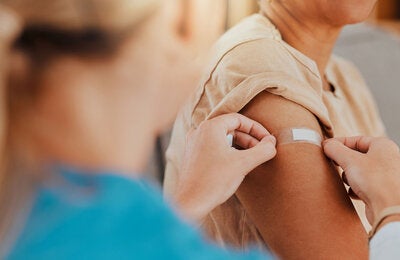

The Pan American Health Organization (PAHO), the District of Columbia Health Department, the U.S. National Park Service, and the American Public Health Association (APHA) today agreed to work together to promote healthy living and healthy settings to improve health, reduce chronic diseases, and enhance quality of life.
Washington, D.C., 20 September 2013 (PAHO/WHO) ? The Pan American Health Organization (PAHO), the District of Columbia Health Department, the U.S. National Park Service, and the American Public Health Association (APHA) today agreed to work together to promote healthy living and healthy settings to improve health, reduce chronic diseases, and enhance quality of life.
Representatives of the four organizations discussed opportunities to collaborate on health promotion at the community, national and international levels during a panel discussion marking Wellness Week 2013 (Sept. 16-20). The panelists included PAHO Director Carissa F. Etienne; D.C. Department of Health Director Joxel Garcia; Capt. Charles L. Higgins, director of the Office of Public Health of the U.S. National Park Service; and Susan Polan, APHA associate executive director of public affairs and advocacy.
Etienne said that PAHO, as an international organization based in the U.S. capital, has a special responsibility and unique opportunities to contribute to improving health in Washington, D.C.
"We live and work in the District of Columbia, and the community of D.C. is our community," she said. "We are happy to work with officials of this community to create healthy settings and translate our advocacy into action."
Joxel Garcia, a former PAHO deputy director who was appointed director of D.C.'s Department of Health in August, noted that Washington is "the most international part of the United States," due to its large diplomatic and immigrant communities as well as its large number of international-organization employees. He said this presents unique opportunities for collaboration with international partners such as PAHO.
"We need to work with partners who know the different people who live and work in the District," said Garcia.
D.C. has a number of health-promotion initiatives now under way, including efforts to improve access to healthy foods in neighborhoods, increase children's use of parks, reduce stress, promote hand-washing, and reduce tobacco consumption. Garcia noted that health-promotion initiatives that are successful in the U.S. capital can also have a powerful demonstration effect throughout the United States and even in other countries of the Americas.
Charles Higgins described the U.S. National Park Service's efforts to promote the "healing power of nature" and called for other organizations to support this work.
"Science is helping us prove that open spaces and natural spaces have always contributed to our health and well-being," he said. He also proposed that PAHO join the U.S. National Park Service in organizing the second "Healthy Parks, Healthy People" international congress, scheduled to be held in Atlanta, Georgia, in July 2015.
Susan Polan, of APHA, noted that PAHO and APHA have a longstanding relationship and a common approach to promoting health.
"Our goal is to promote health in all policies—the idea of making the right choice the easy choice and allowing for access to food and exercise and clean air and clean water," she said.
This year's Wellness Week campaign has been celebrated throughout the Americas under the slogan "Choose health. Eat well. Get moving!" Events organized in PAHO member countries have included:
- In the Bahamas, a week-long program of "Family Fun" activities providing opportunities for health eating and physical activity, and other forms of prevention.
- In Cuba, a "Zumbathon" that featured aerobics synchronized with Cuban rhythms.
- In Paraguay, a campaign by the Ministry of Health to promote the concept of an "active pause," inviting office workers to take a break from sitting at their desks to stretch and move to help relieve postural fatigue and stress.
- In cities and towns in Honduras, El Salvador and Peru, the temporary closure of streets to traffic to allow families to walk and bike safely, along with food and health fairs that showcase healthy eating and prevention.
Wellness Week is a Pan American initiative designed to promote ways cities can help prevent noncommunicable diseases such as cancer, diabetes, and cardiovascular and respiratory diseases by creating environments that promote good nutrition and physical activity and discourage tobacco use and harmful use of alcohol. Wellness Week was originally inspired by Caribbean Wellness Day, celebrated each year on 13 September by Caribbean countries to raise public awareness about noncommunicable diseases and prevention through healthy living.
PAHO, founded in 1902, is the oldest international public health organization in the world. It works with its member countries to improve the health and the quality of life of the people of the Americas. It serves as the Regional Office for the Americas of WHO and is part of the Inter-American system.
Links:



